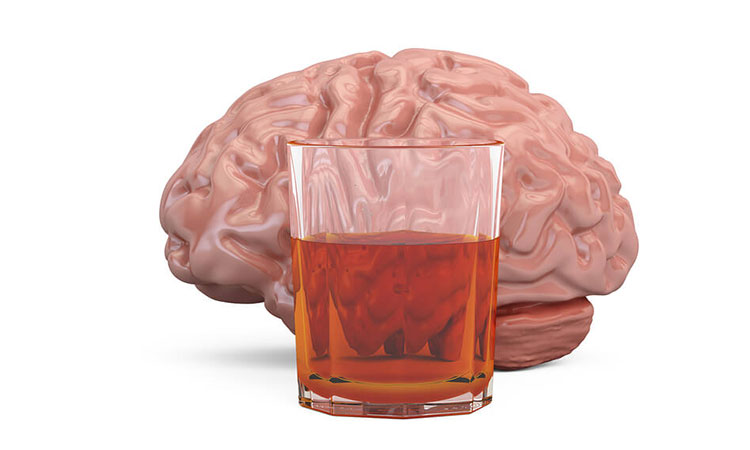
Alcohol and the Brain: The Effects – Alcohol abuse has been linked to a myriad of cognitive changes, including a loss of inhibitions, confused or abnormal thinking, and poor decision-making. Recreational alcohol users usually recover from its effects without incurring any long-term problems.
However, even a short-term loss of control over normal mental functioning can lead to legal and personal problems that would not have occurred if alcohol were not involved.
Alcohol and the Brain
Alcohol is a central nervous system depressant, and the resulting effects can be observed when a person who has been drinking exhibits slurred speech and poor limb coordination that prevents them from being able to walk correctly. Although these signs of intoxication can be easily identified, it’s not as clear how alcohol operates on a deeper level inside the brain and body.
At the neurological level, alcohol works on the receptor sites for the neurotransmitters GABA and dopamine. Alcohol’s activity on GABA causes the outward physiological effects associated with drinking, such as a reduction in movement and impaired speech. Alcohol’s effect on dopamine in the brain’s reward center induces the pleasant feelings that drive many people to continue drinking.
The extent to which alcohol affects a person’s behavior, mood, and neurological functioning depends, in part, on whether blood alcohol content (BAC) is rising or decreasing. After one or two drinks, the person may feel elated or more talkative, but with increasing amounts of alcohol in their system, they become sedated. They start to lose control of their movement, and may also experience impaired thinking and memory loss.
The variation in BAC helps to account for why a person can go from being the life of the party to requiring help with basic functioning such as walking. The following factors have also been shown to impact how alcohol affects a person’s brain functioning over time:
- The amount a person drinks
- How frequently a person drinks
- The age at which drinking was initiated
- How long a person has been consuming alcohol
- The person’s sex, age, genetic factors, and overall health
- If the person’s family has a history of alcoholism
Occasional Drinkers

Among occasional drinkers, alcohol can induce short-term effects after one or more drinks. Memory impairment can begin after just a few drinks and can worsen as alcohol consumption increases. A high volume of alcohol use, especially on an empty stomach, can lead to a blackout.
Occasional drinkers will most likely recover from a blackout without any persistent mental problems. However, there are a number of dangers associated with alcohol intoxication, such as participation in reckless activities like unprotected sex, aggressive or violence behavior, and impaired driving.
Moderate Drinkers
According to the Centers for Disease Control and Prevention, guidelines for moderates drinker are defined as someone who consumes one or two drinks per day (women and men respectively).
But even moderate alcohol consumption has been associated with adverse effects, such as increasing the risk of breast cancer and provoking violence, falls, drownings, and car accidents. Also, moderate drinking does not protect a person from the cognitive impairments linked with drinking or the dangerous consequences that can occur.
Excessive and Chronic Drinkers
Unlike an occasional or moderate drinker, someone who drinks excessively over a prolonged period may develop impairments in brain functioning that persist even after abstinence is attained. Moreover, cognitive problems no longer manifest from consuming alcohol, but rather from brain damage that was caused by past drinking behavior.
According to the National Institute on Alcohol Abuse and Alcoholism, most heavy long-term alcohol abusers will eventually suffer from a mild to moderate impairment of cognitive functioning as well as diminished brain size. The most common deficits as associated with the ability to think abstractly and visuospatial skills (characterized as the ability to represent, analyze, and mentally manipulate objects).
Also, there are a number of brain disorders associated with chronic alcohol use. For instance, research suggests that up to 80% of chronic alcohol users have thiamine (B1) deficiency, and some in this group will advance to a severe brain disorder called Wernicke-Korsakoff syndrome (WKS). Symptoms of WKS include confusion, impaired muscle coordination, and continual problems with memory and learning.
Fortunately, some types of cognitive impairment can be reversed by abstaining from alcohol use. Research has shown that those who have recently undergone medical detox exhibit mild but noticeable improvement in specific cognitive abilities, especially those involving visuospatial tasks, problem-solving, and short-term memory.
Through long-term abstinence, from over several months to a year, a recovering person will continue to improve cognitively, and research shows that brain volume can also increase with abstinence.
Treatment for Alcohol Addiction
Persons suffering from alcohol dependence are urged to seek long-term treatment as soon as possible before more damaging effects can occur. Our center offers evidence-based therapies including psychotherapy, psychoeducation, group support, and individual and family counseling. Clients can undergo treatment on either an inpatient or outpatient basis.
We employ caring addiction specialists who provide clients with the resources and knowledge they need to achieve abstinence and sustain long-lasting sobriety and wellness.
You CAN recover and reclaim the life you deserve. Contact us today to find out how we can help!